10+ Sample Caregiver Contract
-
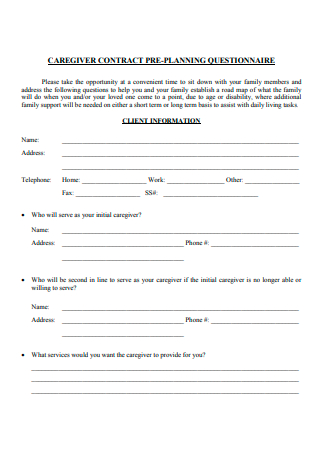
Caregiver Contract Pre-Planning Questionnaire
download now -
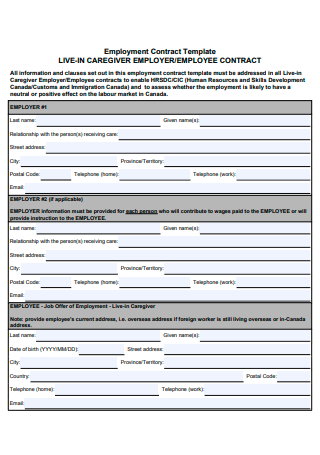
Caregiver Employer Employee Contract
download now -
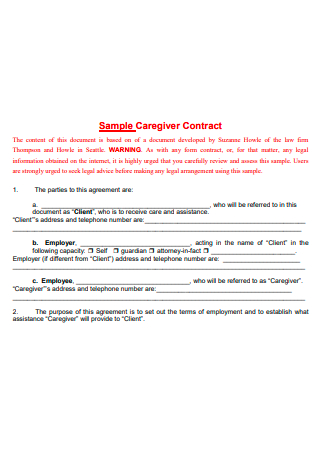
Sample Caregiver Contract
download now -
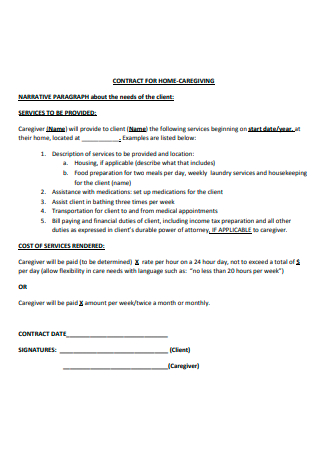
Home Caregiving Contract
download now -
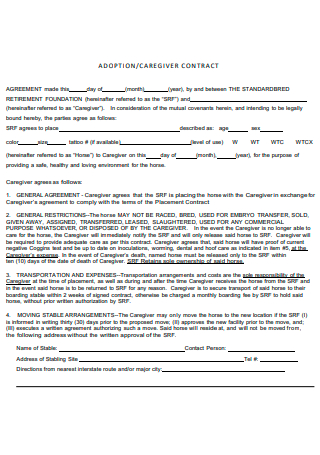
Caregiver Contract Example
download now -
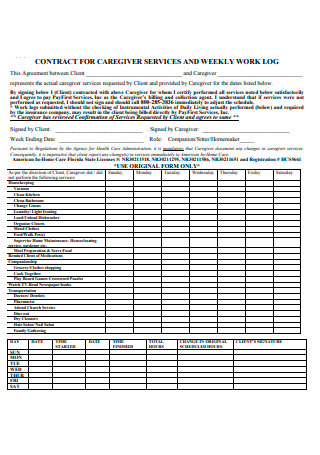
Caregiver Services and Weekly Work Log Contract
download now -
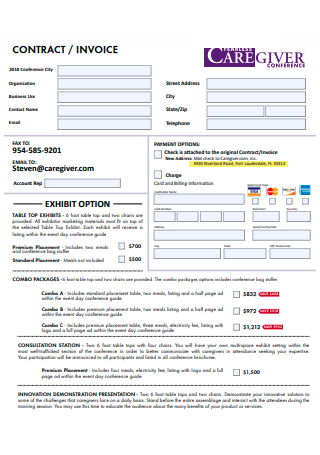
Caregiver Contract Invoice
download now -
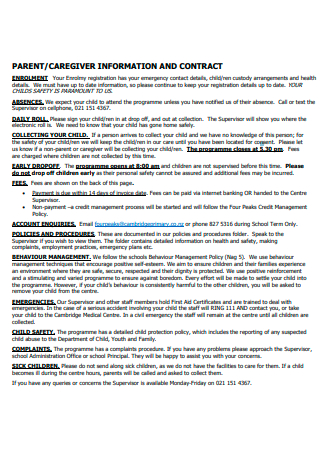
Caregiver Information and Contract
download now -
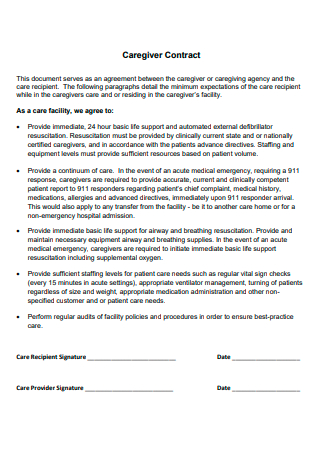
Formal Caregiver Contract
download now -
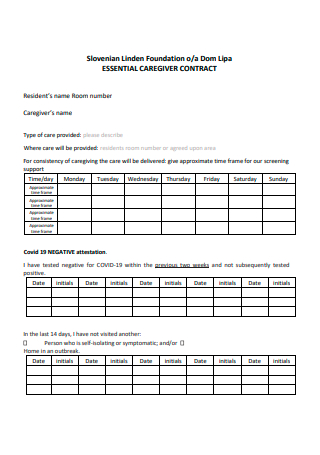
Essential Caregiver Contract
download now -
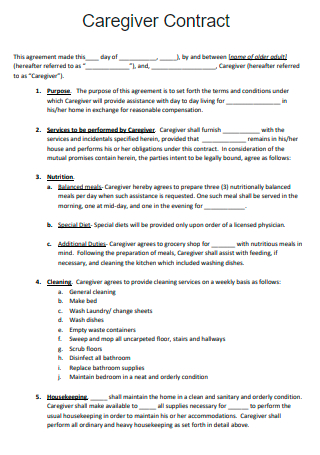
Caregiver Contract in PDF
download now
FREE Caregiver Contract s to Download
10+ Sample Caregiver Contract
What Is a Caregiver Contract?
Does a Caregiver Contract Need to be Notarized?
What Is a Caregiver?
What Elements Should be Included in the Caregiver Contract?
What are the types of caregiver?
How do You Write a Caregiver Contract?
FAQs
How much does a caregiver earn?
Why is being a caregiver hard for the health?
What are unlicensed caregivers not allowed to do?
Can you get PTSD from caregiving?
As caregiver, what are the 2 common stresses?
What is informal and formal care?
While letting someone else take the responsibility of looking after a family member is quite hard, it would somehow save time and the needed care will be given. Additionally, discussing the Caregiver Contract together with the rest of the family members will put everyone at ease especially if everything is detailed out.
What Is a Caregiver Contract?
A caregiver contract is an agreement that ensures caregivers are protected and the family members who are involved in elder care completely understand all expectations and responsibilities of the caregiver. A caregiver contract may also be referred to as a personal care agreement. This kind of contract has become more common as the role of caregiver has evolved both socially and legally over the years.
Caregiver contracts are meant to keep away from any ambiguities that could result to imbalances and grudge among those involved in the care of an elderly individual or someone in need of ongoing care.
Basically, by putting all caregiver expectations and responsibilities in writing, everyone in the family can stay on good terms. Family conflicts can be avoided by carefully outlining all the necessary details of caregiving in this document. And while the elderly individual is assured with the greatest care according to the caregiver agreement, the caregiver is also protected from being exploited and abused.
By exactly defining the right and proper standard of care for a loved one, and the obligations and limitations of caregiving by the caregiver, ambiguities can be avoided for the benefit of everyone involved.
Does a Caregiver Contract Need to be Notarized?
?The caregiver contract should be notarized at the time of signing. It should contain a contract date and it should be signed not only by the recipient of care (if this is not doable, a power of attorney could sign on their behalf), but also by the caregiver who will be doing the services.
In addition to the information of where, when, who, and what, the caregiver contract must also be made according to certain laws that make it enforceable. Here are some of the most essential legal issues to consider when making a caregiving contract: the caregiver contract must be written down before caregiving services occurs; the caregiver contract should provide a detailed list of the services that will be included as well as services that will be excluded. For instance, if non-medical care, meal preparation, light housekeeping, transportation to doctor’s appointments, and basic assistance with the loved one’s activities of daily living are responsibilities that are included in the contract, the caregiver should be compensated fairly for these duties. In addition to this, when the caregiver provides care that goes beyond the responsibilities outlined in the caregiver contract, the caregiver will need to be fairly paid for these activities; the rates listed for services provided must be comparable to the rates that are charged by commercial entities in the same general location that provide personal care; the contract must be signed and dated by both the recipient of care (or a power of attorney) as well as the caregiver and; signatures must be notarized at the time of signing.
What Is a Caregiver?
A caregiver is an individual who offers or gives care to people who need help taking care of themselves. Examples include children, the elderly, or patients who have chronic illnesses or are disabled. Caregivers may be health professionals, social workers, family members, friends, or members of the clergy. They may give care at home or in a hospital or in any other health care setting.
Furthermore, caregivers are there to help with activities of daily living as well as to give companionship for their clients. They do not perform medical care but, caregivers have a personal touch instead. They develop close ties with those in their care as they help with the day-to-day needs that a senior might not be able to do on their own any longer. Whether it is taking a bath, or grocery shopping, or even cooking their meals, a caregiver can help fill in the gap for seniors who otherwise would not be able to continue living on their own.
The professional you need for your loved ones will depend on their needs and kind of situation. A senior may need both a nurse and a caregiver or just one to come into the home each week.
What Elements Should be Included in the Caregiver Contract?
A caregiver contract should always include the general overview of details that refers to the location of caregiving, dates and times, expenses, payment terms, compensation, and benefits. Below is a discussion of the particular details that need to be covered regarding each of these general topics:
Pay
Full-time caregivers should be paid at a reasonable rate for the hours that they will be working. Income should be roughly comparable to what professional caregivers get paid with special attention to medical aid compliance.
In addition to the hourly pay, other aspects of payment must also be included in the contract. What the pay schedule for the caregiver is. If they get paid weekly on a certain day of the week. If they receive payment via bank transfer, as a check, or via another method.
Benefits
In most cases, caregivers give up a job to stay with a loved one during their time of need. If this is the case, the caregiver may be leaving behind a secure income and employment benefits. It is highly important to discuss health insurance options including costs and benefits as well as paid vacation time and sick days as part of the caregiver contract meeting.
Schedule
The responsibilities outlined in a caregiver contract must be dated so that it is clear and understandable and understandable when they start and when they end. An end date may need to be set as a time when family members will reconvene to consider the terms of the agreement anew.
Hours
A caregiver contract is drawn up to define the particulars of a job. As such, it needs to include information about work hours. It is crucial that the number of hours as well as the days of the week when care provision is given are realistic for the caregiver. When the caregiver is unavailable, there needs to be information in the contract about who is responsible for caregiving when the caregiver-in-question is not available.
Responsibilities or General Duties
Each care agency will decide the things that unlicensed caregivers are expected to do for and with clients. They normally include helping with meals; laundry; light cleaning; changing bed sheets and towels; assisting clients with personal hygiene care; helping clients get dressed—from laying clothing out to helping them put clothing on; getting clients’ mail and newspaper; helping with a transfer or walking beside clients who are unsteady, especially to the bathroom or for a walk outside; assisting with toileting; driving clients to run errands, get to an appointment, or meet with others; shopping for items such as food and toiletries; picking up clients’ medications from the pharmacy; reading medication labels for clients and reminding them to take their medications (t may also include handing a pre-filled medication box to a client and opening the lid for them); providing minor first aid per agency policy and procedure; assisting with changing wound care dressings that do not require medication if the agency and state law allow it; lifting light loads and; being a friendly, engaged companion.
In addition to the responsibility of providing care, most caregivers incur expenses when they run errands on behalf of the loved one. Errands may be considered grocery shopping, taking the loved one to doctor’s appointments, or picking up prescriptions. The caregiver contract should include provisions for how to handle these additional expenses.
What are the types of caregiver?
Typically, caregivers refer to anyone who gives care. There are different types of caregivers. When it comes to senior care, these are the types of caregivers:
How do You Write a Caregiver Contract?
Here are some essential provisions every caregiver contract sample should include:
Step 1: Contact Details
Write the names and signatures of the caregiver and care recipient. Also, include the contact information and physical addresses of both signing parties.
Step 2: Date of the Contract
Start the date of the agreement and make sure it is agreed by both parties.
Step 3: Provide the Address:
Give the exact location where the caregiver will work.
Step 4: Role of the Caregiver
Write the status of the caregiver—whether they will act as an independent contractor or an employee. Do not forget to state the thorough description of all caregiver’s responsibilities.
Step 5: Schedule of Activities
How long or how often the caregiver must provide their services to the person they look after.
Step 6: Payment Details
Mention the amount or rate of the caregiver and how they are going to be paid—whether in cash or online banking.
Step 7: About the Tardiness and Absence
Prepare a backup plan just in case the caregiver is absent or late. Make sure to settle and discuss this plan with the rest of your family members.
Step 8: Termination Clause
Write down the reasons for termination and how this legally works.
Step 9: Rights of Both Parties
State the applicable laws. Do not forget to detail out the rights and responsibilities of each party to avoid legal actions.
FAQs
How much does a caregiver earn?
The average pay range for a caregiver differs greatly by as much as $3.12, which suggests there may be many opportunities for advancement and increased pay based on skill level, location, and years of experience. In some cases, the job of a caregiver does not need a formal education, so, it is possible to become one without a high school diploma and still receive an average income.
Why is being a caregiver hard for the health?
Caregiver stress is due to the physical and emotional strain of caregiving. Caregivers report much higher levels of stress than people who are not caregivers. Many caregivers are providing help or are on-call almost every day. Most of the time, this means there is little time for work or other family members or friends.
What are unlicensed caregivers not allowed to do?
Clients or their families may ask caregivers to do tasks that are outside of their qualifications, responsibilities, and job duties as an unlicensed caregiver. Guidelines must be strongly established by the home care agency or organization and communicated to the caregiver. There are a few particular things that are not allowed, such as providing any type of medical services. Unlicensed caregivers may not give medications of any kind; mix medications for clients or fill their daily med minder box; give advice about medications; perform a medical assessment and/or; provide medical care.
Can you get PTSD from caregiving?
If you struggled with trauma in the past or are suddenly thrown into a caregiver role without being prepared, caregiving can lead to PTSD symptoms. Life experiences can adversely affect caregivers, too, including their socioeconomic status, divorce, or the death of a child or parent.
As caregiver, what are the 2 common stresses?
Studies show that 30 to 40% of dementia caregiver suffer from both depression and emotional stress. Caregivers say that they are stressed and frustrated. While, 16% of caregivers are emotionally strained, about 26% state that taking care of their loved one is harder on them emotionally.
What is informal and formal care?
Formal care for older people refers to paid care services provided by a healthcare institution or individual for a person in need. Informal care refers to unpaid care provided by family, friends, close relatives, and neighbors.
Although the caregiving role is highly variable over time, various phases in the caregiving trajectory can be discerned when the role is considered long-term. Without having a caregiver agreement in place, the patient’s medical aid eligibility may be questioned, as well as the possibility to face delays with processing. One may be penalized when all along they have been taking care of their family member as much as a professionally-employed caregiver. This is why personal care contracts are so essential, as regulations can be very complex and vary according to state. To be on the safe side, always consult an elder law attorney or legal office to check the rules pertaining to your state. Based on federal requirements, the general program rules for medical aid eligibility and what services are financed have some flexibility on how they may work—meaning that you will probably find the experience of others different from yours.
